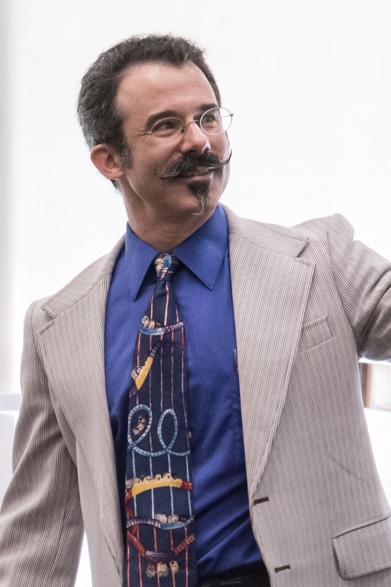Don't see what you're looking for?
Main Site
Berklee.eduCampuses and Schools

Michael Heyman
For media inquiries, please contact Media Relations
Michael Heyman is a scholar and writer of literary nonsense and children’s literature, and a professor of literature at Berklee College of Music. He teaches courses on children’s literature and music, poetry, performance poetry, nonsense literature, and arthropodiatry. His articles have appeared in the ChLA Quarterly, The Horn Book Magazine, Words Without Borders, and The Lion and the Unicorn, where he was also a four-time judge for the Lion and the Unicorn Award for Excellence in North American Poetry. He is the head editor of The Tenth Rasa: An Anthology of Indian Nonsense (Penguin 2007). His poems and stories for children can be found in The Puffin Book of Bedtime Stories (2005), The Moustache Maharishi and Other Unlikely Stories (Scholastic 2007), and This Book Makes No Sense: Nonsense Poems and Worse (Scholastic 2012), the latter of which he also edited. More recently, he was a guest editor for the nonsense literature issue of IBBY’s Bookbird (2016). He plays the saxophone, tablas, flute, and the diddlemaphone.
- Editor and contributor of poems and stories, This Book Makes No Sense: Nonsense Poems and Worse (Scholastic, 2012)
- Short stories and poetry for children and adults published in The Moustache Maharishi and Other Unlikely Stories (Scholastic), The Puffin Book of Bedtime Stories (Puffin), and Solstice: A Magazine of Diverse Voices
- Articles published in The Horn Book Magazine, Children's Literature Association Quarterly, The Lion and the Unicorn, The Five Owls, Words Without Borders, Children's Literature and the Fin de Siecle, and Keywords for Children's Literature
- Founder of the College Writing Center and the Slam Poetry program
- Consulting editor, FUSION magazine
- Four-time judge for The Lion and the Unicorn Award for Excellence in North American Poetry
- Dramaturge for NIX, a production by The Only Animal, Vancouver, Canada
- Instruments include, tenor/baritone saxophone, flute, tabla (studied with Pandit Sharda Sahai), throat singing, and diddlemaphone
- Head editor of The Tenth Rasa: An Anthology of Indian Nonsense (Penguin, 2007)
- Papers published in The Horn Book, Children's Literature Association Quarterly, The Lion and the Unicorn, The Five Owls, and Children's Literature and the Fin de Siecle
- Alumnus, Berklee College of Music
- B.A., Franklin and Marshall College
- M.Phil., Oxford University
- Ph.D., University of Glasgow
"Having been a student here, I feel a real connection with the institution and the students. I can't imagine a better place for me to teach. At Berklee, I can pursue both of my passions: literature and music. I develop both as I meet talented students and faculty, and as I do my own research, professional and creative writing, and musical projects."
"In addition to poetry and literature from around the world, I teach nonsense literature. This might sound strange. It's not something students would see in a typical college literature class, but I suppose mine are not typical college literature classes. Behind the fun and craziness of literary nonsense is a rigorous sense of aesthetics and a bedrock of intelligent and constructive rebellion—a way of questioning the status quo and an outlet for individual, creative thought. What better education for a Berklee student, or anyone for that matter?"
"My Children's Literature and Music class is all about respecting children and recognizing how our culture is created and sustained by them. All of the good and all of the bad in our cultures start with how we raise our children. I try to show students how to appreciate the amazing literature and music out there for kids. In the process, we question our preconceived notions of childhood, and hopefully come out with a fresh awareness of our culture and ourselves. The last step is to put students on the path to creating intellectually challenging and aesthetically interesting entertainment and education for children. All of this knowledge also can serve as a way to get into the extremely lucrative industry of children's entertainment and education!"
